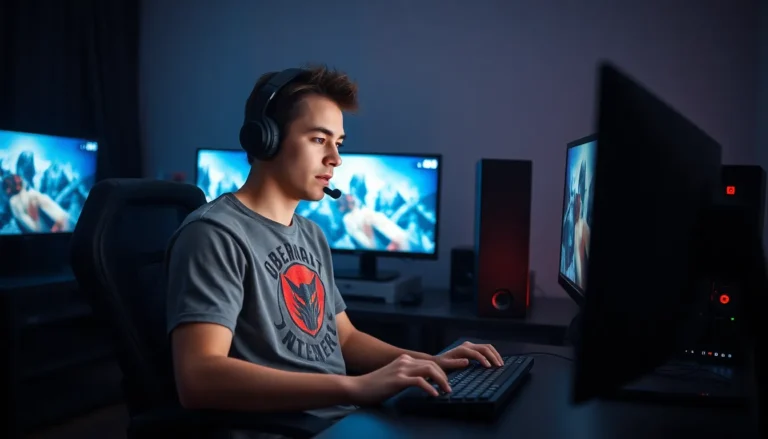In today’s digital age, remote job interviews have become the new norm, transforming the hiring landscape. With companies embracing flexible work arrangements, candidates now face unique challenges and opportunities when interviewing from the comfort of their homes. Understanding how to navigate this virtual process is crucial for success.
Remote interviews demand a different set of skills compared to traditional face-to-face meetings. Candidates must adapt to technology, engage effectively through screens, and present themselves professionally in a virtual setting. As more employers prioritize remote work, mastering the art of remote interviews can set candidates apart in a competitive job market.
Table of Contents
ToggleUnderstanding Remote Job Interviews
Remote job interviews represent a significant shift in the hiring landscape. They offer unique advantages and challenges that candidates must navigate effectively.
Definition and Importance
Remote job interviews occur through video conferencing platforms or online tools instead of traditional face-to-face meetings. These interviews provide flexibility for both employers and candidates, allowing for a broader candidate pool and eliminating geographical constraints. Their importance lies in the ability to assess candidates’ skills and cultural fit without requiring travel, ultimately streamlining the recruitment process.
Differences from In-Person Interviews
Remote interviews differ from in-person interviews in several key areas:
- Technology requirements: Candidates need to be proficient with video conferencing software and related tools. Familiarity with settings, sound, and video quality enhances the experience.
- Non-verbal communication: Non-verbal cues, such as body language and eye contact, translate differently on screen. Candidates must learn to convey engagement clearly through the camera.
- Interview environment: The surroundings during a remote interview can impact perception. Candidates should choose a quiet, distraction-free space, reflecting professionalism.
- Time management: Remote interviews often necessitate strict adherence to time limits. Candidates must manage their responses efficiently to align with interviewers’ schedules.
- Follow-up etiquette: Post-interview communication can vary. Emails or messages may serve as primary follow-ups rather than face-to-face thank-yous, requiring candidates to adapt their approach accordingly.
Preparing for Remote Job Interviews

Preparing for remote job interviews requires specific steps to ensure a successful experience. Candidates must prioritize both technical readiness and thorough knowledge of the potential employer.
Technical Setup
Technical setup plays a vital role in remote interviews. Candidates must:
- Check equipment functionality: Verify that computers, cameras, and microphones work properly. Testing these before the interview prevents technical glitches.
- Optimize internet connection: Ensure a stable, high-speed internet connection during the interview. A wired connection often provides more reliability than Wi-Fi.
- Familiarize with software: Learn the video conferencing platform used for the interview. Understanding features like mute, screen sharing, and chat options promotes smoother interaction.
- Create a distraction-free environment: Choose a quiet, well-lit space to minimize interruptions. A professional background enhances the overall impression conveyed during the interview.
Researching the Company
Researching the company provides essential context for responses during interviews. Candidates must:
- Understand mission and values: Familiarize with the company’s mission statement and core values. Aligning personal values with the company’s enhances responses.
- Know current projects: Investigate recent initiatives or projects the company undertakes. This knowledge allows candidates to express genuine interest and tailor their questions effectively.
- Review industry trends: Gain insights into industry trends and challenges. Demonstrating awareness of the broader landscape positions candidates as informed and engaged.
- Connect with employees: Reach out to current or former employees via LinkedIn. Engaging in informal conversations can yield valuable insights about company culture and expectations.
Effective preparation in these areas equips candidates for success in remote job interviews.
Best Practices During Remote Job Interviews
Achieving success in remote job interviews requires specific practices tailored to the virtual environment. Candidates should focus on effective communication and mindful presentation skills.
Effective Communication Skills
Demonstrating clear communication skills is vital during remote job interviews. Candidates should:
- Speak Clearly: Articulate responses to ensure interviewers understand.
- Use Active Listening: Engage by nodding or using affirmations, which shows attentiveness.
- Ask Clarifying Questions: If unclear about a question, request further information to provide precise answers.
- Summarize Key Points: Repeat essential elements from previous discussion points to reinforce understanding.
These strategies enhance interaction and present candidates as responsive and engaged participants.
Body Language and Presentation
Non-verbal cues significantly affect the perception of candidates during remote interviews. Candidates should:
- Maintain Eye Contact: Look into the camera to simulate eye contact, fostering connection.
- Adopt an Open Posture: Sit up straight with hands visible to convey openness and confidence.
- Limit Distractions: Ensure a clean, professional background and mute notifications to remain focused.
- Dress Professionally: Choose appropriate attire as if attending an in-person interview, reinforcing professionalism.
Implementing these body language practices helps create a positive impression and supports effective communication throughout the interview.
Common Challenges and Solutions
Remote job interviews present unique challenges that candidates must navigate. Addressing these issues effectively boosts the likelihood of success.
Technical Difficulties
Technical difficulties can derail an interview. Problems like poor internet connections, software glitches, or malfunctioning equipment often disrupt the flow of conversation.
- Testing Equipment: Candidates should check cameras, microphones, and speakers before the interview. Conducting a test run with a friend can identify potential issues.
- Internet Connection: Ensuring a stable internet connection is crucial. Candidates should opt for a wired connection when possible or position themselves near the router.
- Backup Options: Keeping a backup device, such as a smartphone, can provide an alternative if primary equipment fails. Preparing a short list of possible solutions, like switching to a different platform or rescheduling, enhances readiness.
Interview Anxiety
Interview anxiety can hinder a candidate’s performance. The unfamiliarity of a virtual setting can amplify nervousness.
- Practice: Mock interviews with peers or mentors can build confidence. Repeated exposure to the interview format familiarizes candidates with the technology and reduces anxiety.
- Preparation Techniques: Deep-breathing exercises or mindfulness meditation before the interview can help candidates maintain composure. Visualizing success during the interview can also create a positive mindset.
- Familiar Environment: Choosing a comfortable and quiet environment for the interview helps create a sense of calm. Adding personal touches, like favorite pictures or plants, can enhance comfort levels.
Navigating these challenges effectively enables candidates to present themselves confidently and competently in remote job interviews.
Remote job interviews are here to stay and adapting to this new format is essential for candidates aiming to succeed in today’s job market. By mastering the unique skills required for virtual interviews and preparing thoroughly, candidates can stand out from the competition. Emphasizing effective communication and technical readiness helps create a lasting impression.
Navigating the challenges of remote interviews can be daunting but with the right strategies in place, candidates can present themselves confidently. As the hiring landscape continues to evolve, those who embrace these changes will find themselves better equipped to seize exciting opportunities in a remote work environment.




